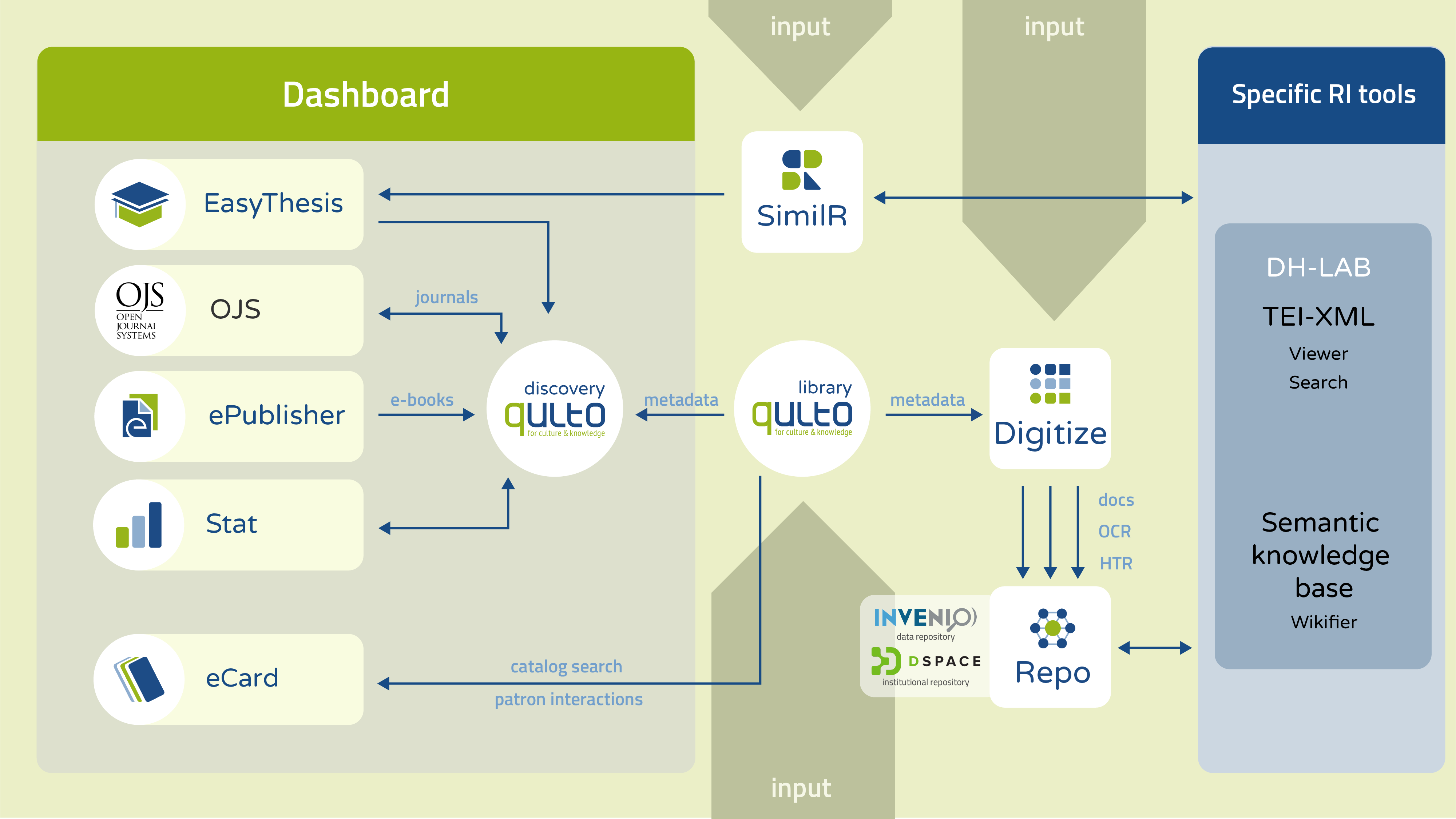Qulto infrastructure for higher education and research
The Qulto Research Infrastructure is a distributed and virtual, domain-independent research infrastructure that provides essential support for the digitization, storage, organization, retrieval, publication, reuse, and search for relevant sources and plagiarism of higher education and research content.
Want to read about a use-case project?
QULTO and DH-LAB linked research infrastructures
A versatile research platform has been created by connecting the Qulto research infrastructures, developed with the professional assistance of the Department of Digital Humanities at Eötvös Loránd University Faculty of Humanities, Budapest, with the support of the National Laboratory of Digital Heritage, and created by Qulto, and deeply embedded in the national scientific space.
The above consortium has created a hardware and software infrastructure for the artificial intelligence-based processing, research, education and publication of national cultural heritage using proprietary language processing applications.
The QULTO and DH-LAB integrated research infrastructure provides the following tools:
Workflow tools
- metadata management – Qulto Library
- digitization framework (machine learning assisted OCR, proofreading, DRM) – Qulto Digitize
- optional digital file manager, repository and data repository (InvenioRDM, DSPACE, EPrints, OMEKA, etc.) – Qulto Repo
- source and plagiarism finder – Qulto SimilR
- semantic knowledge base, Wikifier based semantic web building based on metadata
- TEI XML visualization (e.g. by displaying annotations and other data)
- PDF annotator
- discovery/search – Qulto Discovery
Publishing tools
- thesis manager – Qulto EasyThesis
- e-learning, e-publishing – Qulto ePublisher
- editorial system (OJS)
Data management tools
- data visualization – Qulto Stat
- data and content aggregator

CORE PRODUCTS OF THE INFRASTRUCTURE
Qulto Library
Qulto Library, being an integrated library system, is the main pillar and data source of the university knowledge base.
Qulto ILS simplifies the management of library resources and the construction of various catalogs, so with its help, the record databases and digital objects (being the core of services offered to both researchers and students) become transparent and easy to manage.


Digitize
Digitize is a Digital Asset Management System (DAM) that enables the digitization of image and textual content, as well as the management, sharing and delivery of image, textual and audiovisual content as digital objects both to individual users and user communities. This framework has been specifically designed to support education, research, e-learning processes and digitization of public collections.
Repo
Based on open source software such as DSpace7, InvenioRDM or EPrints, this module helps higher education institutions manage their digital content with ease – all content can be associated with standard descriptive elements that facilitate searchability and ensure interoperability between different systems. Our solution also supports full-text indexing and search to ensure maximum accessibility and searchability.
With Qulto Repo we encourage the simultaneous use of various repository tools for specific goals, for instance DSpace7 as the institutional repository for publications and research outputs, and InvenioRDM for textual research items (raw texts, XML formats, etc.) maintained by the researchers’ community.


SimilR
Hosted locally or as a cloud service, Qulto SimilR is a software for finding text similarities between text documents. It allows multiple institutional and individual users to perform simultaneous analyses on individual, shared and web corpora. SimilR can be used to (self-) check plagiarism but it is also a useful tool in the field of digital humanities.
Discovery
Supporting the professional work of libraries and higher education institutions, Discovery provides a shared online interface to search library catalogs, full-text repository content, research data, online articles, e-publications and e-learning materials.


EasyThesis
A thesis management module born to back the entire process of submission, review and assessment of theses. It acts as a link between the student management system, the institutional repository and the Discovery system.
ePublisher
Qulto ePublisher can handle all the publications that the university press publishes (monographs, learning materials) or the university library acquires in digital format (e.g. e-book databases, audiobooks) or open access digital resources.


Stat
Our module gives your institution an insight into workflows and interactions taking place both in the institution and Qulto services. Monitor staff efficiency, habits of visitors to your virtual platform or data traffic through the entire system and server.
Dashboard
A personalized and individually customisable web interface, where all the services are connected. The researcher/student dashboard ensures the integration of identifiers used in various research spaces (ORCID, scopusID, Google Scholar ID), so that logged-in users’ own content can be presented immediately.
